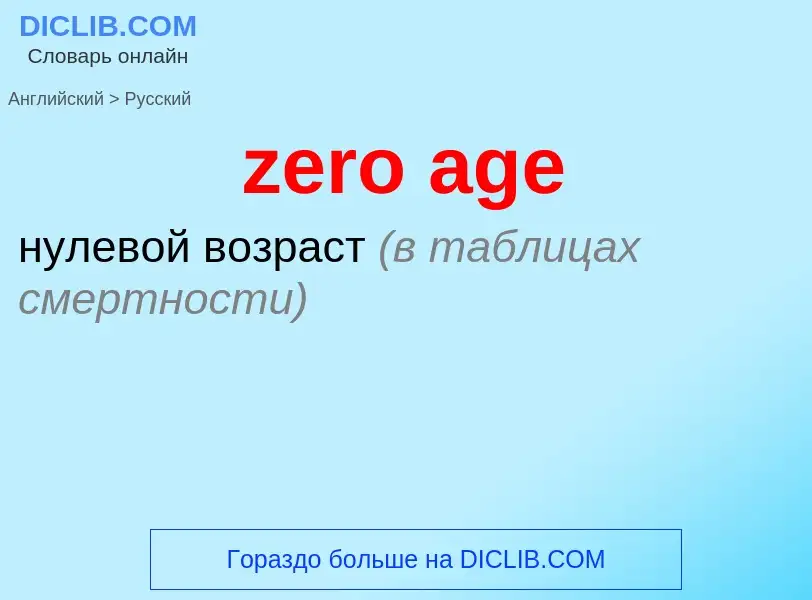Übersetzung und Analyse von Wörtern durch künstliche Intelligenz ChatGPT
Auf dieser Seite erhalten Sie eine detaillierte Analyse eines Wortes oder einer Phrase mithilfe der besten heute verfügbaren Technologie der künstlichen Intelligenz:
- wie das Wort verwendet wird
- Häufigkeit der Nutzung
- es wird häufiger in mündlicher oder schriftlicher Rede verwendet
- Wortübersetzungsoptionen
- Anwendungsbeispiele (mehrere Phrasen mit Übersetzung)
- Etymologie
zero age - Übersetzung nach russisch
2) срок службы, длительность работы (оборудования)
3) демогр. поколение
4) эра; период
5) с.-х. выдерживать; созревать
- age at divorce
- age at entry
- age at expiry
- age at the first union
- age at the last birthday
- age at the nearest birthday
- age at the next birthday
- age at withdrawal
- be of age
- be under age
- come of age
- age of consent
- age of discretion
- age of entry into insurance
- age of majority
- adult age
- breeding age
- childbearing age
- child producing age
- chronological age
- dependent age
- estimated age
- exact age
- extreme old age
- fertile age
- full age
- giving age
- juvenile age
- legal age
- limiting age
- market age
- marriage age
- maternal age
- maximum age
- mean age
- median age
- middle age
- migrating age
- minimum age at marriage
- modal age at death
- normal age at death
- nuptial age
- old age
- parental age
- pension age
- pensionable age
- physiologic age
- pivotal age
- postchildbearing age
- primary school age
- productive age
- propagative age
- reproductive age
- retirement age
- school age
- school leaving age
- secondary school age
- weaning age
- widowhood age
- zero age
[eidʒ]
общая лексика
возраст
определять возраст
период
эпоха
старость
стареть
изменяться во времени
совершеннолетие
поколение
век
изменение свойств в результате старения
выдерживать (в определенных условиях)
вылеживаться
подвергать старению
химия
окисляться
строительное дело
продолжительность
срок службы
нефтегазовая промышленность
век, эра
возраст (геологический)
продолжительность работы
продолжительность службы
срок службы (оборудования, инструмента)
окисляться (о топливах и маслах при хранении)
терять активность (о катализаторе)
существительное
[eidʒ]
общая лексика
возраст
продолжительность
срок жизни
обыкн. [разг.] долгий срок
вечность
старость
дряхлость
в грам. знач. прил. возрастной (преим. в статистике)
юриспруденция
совершеннолетие
геология
период
эра
история
век
эпоха
возвышенное выражение
поколение
техника
срок службы (машины и т. п.)
карточный термин
игрок
сидящий слева от сдающего (покер)
синоним
глагол
общая лексика
стареть
стариться
состарить
старить
техника
подвергать старению
специальный термин
выдерживать
подвергать искусственному старению
вызревать
электротехника
тренировать
синоним
Definition
Wikipedia
Zero Zero was an alternative comics anthology published by Fantagraphics Books from 1995 to 2000. It was printed in a typical 6½″ × 9¾″ comic book format. Issues ranged between 40 and 64 pages in length, printed mostly in black-and-white with a color cover but occasionally including sections printed in one or two colors, notably a series of stories by Al Columbia. Its release schedule fluctuated between bimonthly and quarterly intervals over the course of its run.
A significant proportion of Zero Zero's pages were given over to serialized works, including Richard Sala's The Chuckling Whatsit, Dave Cooper's Crumple, Mack White's Homunculus, Kaz and Timothy Georgarakis's Meat Box, and Kim Deitch's The Strange Secret of Molly O'Dare and The Search for Smilin' Ed. Derf Backderf's short strip "My Friend Dahmer", which he later expanded to an award-winning graphic novel of the same name, also appeared in its pages.
Early issues of Zero Zero were not numbered, but the back cover of each issue featured a captioned illustration depicting an ordinal "Sign of the Impending Apocalypse" which also served as an ad hoc numbering system. For the twenty-seventh and final issue this feature was replaced with an Al Columbia strip, "Vladimir Nabokov's 'Cheapy the Guinea Pig'", depicting the killing of an experimental subject.

